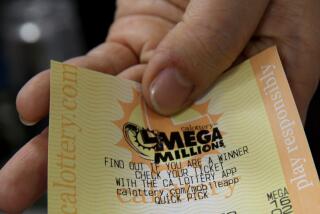Big Firms Will Bid for Slice of $200 Million in State Lottery Business
- Share via
SACRAMENTO — Lured by prospects of a contract worth as much as $200 million over four years, most of the country’s largest lottery companies have told the Deukmejian Administration that they now intend to bid for a share of the California lottery, despite the state’s stringent disclosure requirements, it was learned Wednesday.
Their sudden willingness has apparently dashed the chances of a legislative bill that would loosen financial disclosure rules in an effort to get more of the large companies to bid. That bill also would guarantee that firms led by women and minorities be given a slice of the state’s lottery business.
At least four of the five major lottery companies had objected to the disclosure provisions and only now put the word out that they will comply as the bidding time draws nearer.
Lobbyists, Officials Meet
Lobbyists for two of the country’s largest computer lottery companies, General Instrument Corp. and Control Data Corp., met Tuesday in the governor’s office with state lottery director Mark Michalko, Assemblyman Frank Hill (R-Whittier) and two of the governor’s legislative aides.
According to Michalko and Hill, who arranged the session, the companies said that they will enter the competition later this year, when the lottery seeks bids for its computerized lotto and numbers games.
The multiyear contract for the games is expected to be the largest single contract in American lottery history, worth an estimated $200 million over four years.
Hill, who has represented the Administration in negotiations with the Legislature, said he also contacted a lobbyist for Syntech International, who told him that the company is definitely planning to bid.
Scientific Games, the company that drafted the lottery initiative and spent more than $2 million to win its passage, already has met the disclosure requirements in its winning bid for the lottery’s instant ticket game, scheduled to begin Oct. 3.
The companies are among the five that currently operate all the computerized state lotto and numbers games in the United States.
Only the fifth company, GTECH Inc., has said that it will not be a bidder in California.
“We can’t force our shareholders to meet the financial disclosure requirements,” said John Jervis, a spokesman for the company. Among the shareholders with 5% or more ownership in the company are the billionaire Bass brothers, Texas financiers who would not be willing to file three years of personal income tax statements with the California Lottery and the state attorney general, as the 1984 ballot initiative requires.
Can Live With Initiative
“The purpose of the meeting Tuesday was to find out whether the initiative’s disclosure provisions would preclude (some companies) from participating,” Michalko said. “The answer is they can live with the initiative as it stands today.”
Assembly Democrats have insisted that the bill to relax disclosure restrictions also include a requirement that 30% of all large contracts be subcontracted to firms led by minorities and women.
But the precise percentage has become negotiable in the last few days. “We’re willing to compromise,” said Assemblywoman Maxine Waters (D-Los Angeles). “We’re not wedded to 30%.”
Assembly Republicans, backed by the Deukmejian Administration, objected, however, to establishing what they regard as an unprecedented quota system in the awarding of a state contract.
There were fears that Scientific Games would be the only company bidding on the computerized lotto contract.
More to Read
Get the L.A. Times Politics newsletter
Deeply reported insights into legislation, politics and policy from Sacramento, Washington and beyond. In your inbox twice per week.
You may occasionally receive promotional content from the Los Angeles Times.










